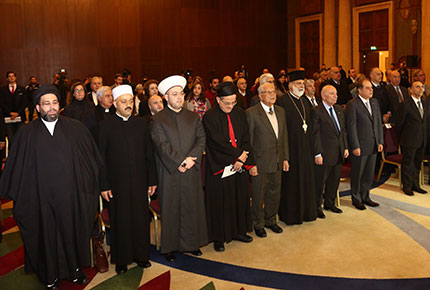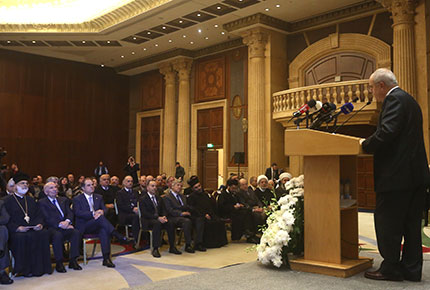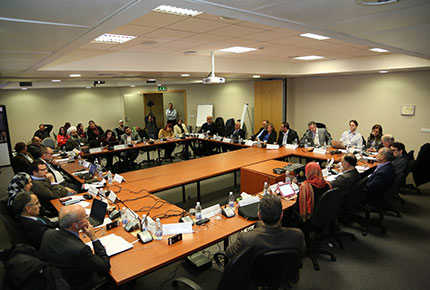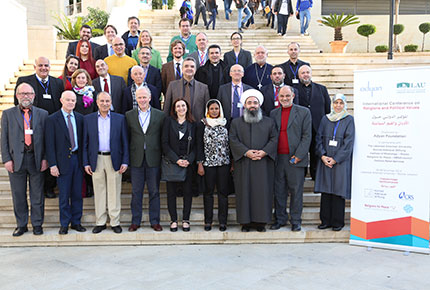Of politics and religion
Academics, dignitaries and guests gather at the opening ceremony of a conference on religion and political values organized by Adyan in partnership with LAU.

The overall sentiment of the conference was perhaps best summed up in the address delivered on behalf of Cardinal Mar Bechara Boutros al Raï, Maronite Patriarch of Antioch and all the East: “Separating religion and state does not mean a separation of state from God.”

Experts from 17 countries attended to present their research and thoughts during the six distinct panels held at LAU Byblos.

LAU faculty members of the political science and international affairs program were among those who spoke at and chaired various panels.

Conference partners Konrad Adenauer Stiftung focused on coexistence and the unity between different religions, as well as the profound relationship between social trust and good governance.
International and local scholars, theologians and policy makers attended the international conference on religion and political values organized by the Adyan foundation in partnership with LAU and hosted at the university’s Byblos campus on November 26-28. The event kicked off with a ceremony where organizers and dignitaries spoke of the importance of academic cooperation and research into the relationship between religion and politics.
The evening’s guests were introduced by journalist Tania Awad Ghorra who expressed how “great it is to be at a conference with no political agenda that will ultimately influence politics,” before introducing Dr. Nayla Tabbara, director of the Cross-Cultural Studies Department of the Adyan foundation.
“Promoting both inter-faith and scholarly dialogue is the goal of this event,” explained Tabbara, expressing her hope that the conference be a launching pad for “a broad interdisciplinary conversation.” This goal was evident in the diversity of experts from 17 countries who attended to present their research and thoughts during one of the six distinct panels held over the following two days.
Among them were LAU professors of political science Dr. Sami Baroudi, who spoke about moderate Islam and international relations, and Dr. Makram Ouaiss, who spoke about Lebanese civil society and its role in reconciling religion and politics as part of a panel about contemporary challenges for religion and political values. Chairing the panel was LAU associate professor of political science and international affairs Dr. Marwan Rowayheb. “I was delighted to be part of a group of scholars and experts advocating the importance of dialogue, the consolidation of moderation and the rejection of violence.”
For LAU Provost George Najjar “LAU is focused on ethically anchored education and in being part of this conference we are being true to our basic mission,” he said adding that the university is very much aware of the faith deficit prevalent in the modern world. “To see the world through a technical lens is to miss the bigger picture.”
Conference partners Konrad Adenauer Stiftung, a German political foundation, and Religions for Peace, the world’s largest interfaith coalition, were represented at the ceremony by Peter Rimmele and William Vendley respectively. While Rimmele in his opening address focused on coexistence and the need to look at the similarities that bind people from different religions, Vendley spoke about the profound relationship between social trust and good governance.
“There is no country on earth,” argued Vendley, “where the topic of religion and politics is not extremely important.” Consideration of deeply held and widely shared values as a foundation for governance, continued Vendley, would avoid the two extreme alternatives of a pervasive disorder of the soul on the one hand should no link be considered between religion and governance and, on the other hand, oppressive governance through religious extremism.
Adyan chairman Fadi Daou echoed the sentiment and said the “society, both civil and academic, share the responsibility for protecting religion against its use in political battles as well as safeguarding politics against religious indoctrination.”
More
Latest Stories
- Blending Coding Education With Career Exploration
- LAU Alumnus Helms Seminar on Entrepreneurship and Sustainability
- On Point Celebrates Student Innovation and Commitment to Accreditation
- LAU Kicks off the Seventh Season of the Jr. NBA League
- Bridging Policy, Science and Society to Tackle Lebanon’s Environmental Challenges
- Understanding a Core Security Gap in Drone Operations
- LAU’s AKSOB Hosts a Timely Debate on Digital Banking and the Future of Finance
- LAU Study Maps Antibiotic Resistance in Lebanese Wastewater

